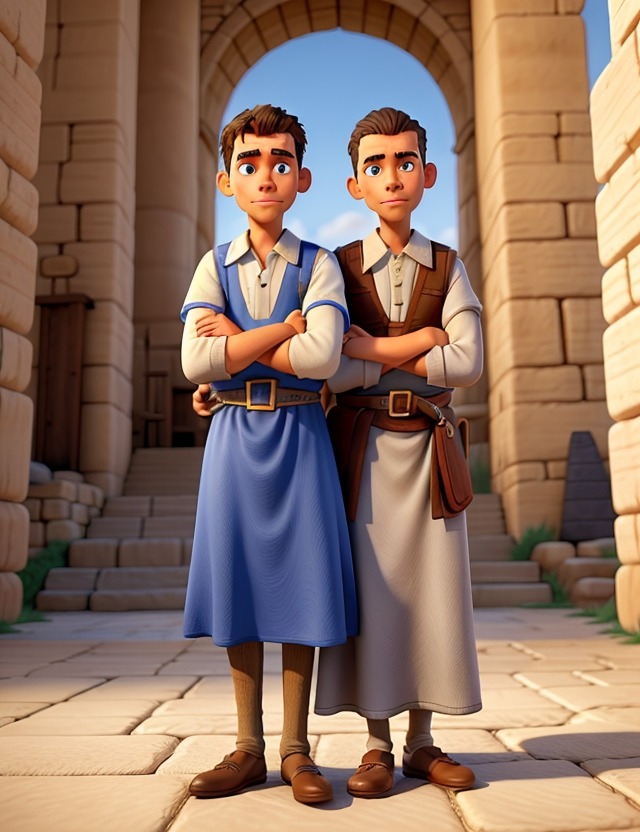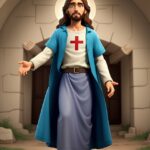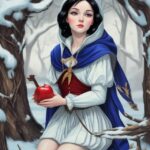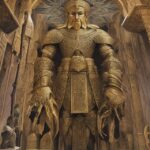Amidst the vast tapestry of ancient biblical narratives, few stories captivate our imaginations with such sheer complexity and profound human dynamics as the tale of Jacob and Esau. Passed down through generations, this timeless saga delves into the intricate intricacies of brotherhood, sacrifice, betrayal, and redemption. Today, we embark on a compelling journey, unlocking the hidden depths of this iconic biblical account, unraveling its metaphorical threads, and gleaning invaluable wisdom from the lives of these iconic siblings.
- The Story of Jacob and Esau Summary
- Jacob and Esau: Key Themes
- Jacob and Esau Genesis Twins: Characters
- Jacob and Esau: Symbols
- Jacob and Esau Bible Verse
- Jacob and Esau Reconciliation Lesson
- Jacob and Esau Were Twins
- Parents of Jacob and Esau
- Differences Between Jacob and Esau
- Jacob and Esau: Culture Impact
- FAQs
So, without further ado, let us peer beyond the veil of time and immerse ourselves in a narrative that continues to resonate with readers worldwide. Brace yourself for an unforgettable odyssey through the tales of Jacob and Esau, where the profound power of brotherhood leaves an indelible imprint upon our collective consciousness.
The Story of Jacob and Esau Summary
Once upon a time, in the land of Canaan, there lived a family comprising of a father named Isaac and his two sons, Jacob and Esau. Isaac and his wife, Rebekah, loved their sons dearly but little did they know that their different personalities would lead them on a remarkable journey of self-discovery, forgiveness, and brotherly love.
Jacob and Esau were not just brothers, they were twins! Although they were born on the same day, they couldn’t be more different. Esau was the older twin, strong and adventurous, loved to spend his days hunting in the nearby forests and exploring the wilds around their home. On the other hand, Jacob was more introverted, preferring to stay closer to home, tending to the family’s flock of sheep. Despite their differences, the boys were the best of friends and shared many happy moments together.
Now, it so happened that Isaac, their father, was growing old, and his eyesight was failing. Sensing his advancing age, he decided it was time to pass on his blessings to his sons. In those times, the father’s blessing was a sacred tradition, where he would bestow upon his chosen son a special gift, making them the leader and guardian of the family.
Isaac called Esau, his favorite, and asked him to go hunting and prepare a delicious meal upon his return. Isaac intended to bless Esau before his final days. Esau, excited by the thought of receiving his father’s blessings, hurriedly left for the hunt. Hearing this conversation between Isaac and Esau, Rebekah, the boys’ mother, had a different plan in mind.
Rebekah loved Jacob very much and believed that he was the one who deserved the blessings. So, she quickly called Jacob and explained her plan. She asked Jacob to dress up as Esau, prepare a tasty meal, and bring it to Isaac. Trembling with nervousness, Jacob agreed and set out to fulfill his mother’s wish.
Jacob knew that he had to make the most delicious meal ever, as Isaac would only be convinced if the food was simply irresistible. So, he gathered all the tastiest ingredients, carefully cooked them, and prepared a mouthwatering dish. Meanwhile, Esau was still out hunting, clueless about what was happening back at home.
With the meal ready, Jacob put on Esau’s clothes and wrapped animal skins around his arms to mimic his brother’s hairy arms. He even put on Esau’s favorite cologne to make sure he smelled like him. Slowly, he walked into Isaac’s room, where his father lay waiting to receive the meal.
Isaac, whose eyesight was failing, was surprised at the arrival of “Esau.” He asked, “Who are you, my son?” Trying to sound like Esau, Jacob replied, “It is me, Esau, your firstborn. I have brought you the meal you requested.” Isaac was hesitant, as his ears detected a difference in voice, but his sense of smell convinced him otherwise.
Isaac ate the meal and, being deceived by the disguise, believed he was bestowing the blessings onto Esau. He said, “May God give you the dew of heaven and the riches of the earth. You shall be the ruler over your brothers, and nations shall bow down to you.” Jacob, feeling both excited and guilty, received his father’s blessings, knowing that he had lied to receive them.
Just as Isaac finished speaking, Esau returned from his hunt. To his shock and dismay, he discovered that his brother had deceived their father and stolen the blessings meant for him. Esau’s heart filled with anger and he swore to take revenge on Jacob.
Rebekah, who had been anxiously waiting for Esau’s return, heard of Esau’s anger and fled to her brother Laban’s house, fearful for Jacob’s safety. She knew that Jacob had to leave until Esau’s anger subsided. She bid her son farewell, with tears in her eyes, not knowing when they would see each other again.
Jacob embarked on a long journey to stay with his uncle Laban. Along the way, he stopped to rest and had a remarkable dream. In his dream, he saw a ladder reaching up into the heavens, with angels ascending and descending upon it. At the top of the ladder stood God, reassuring Jacob that He would be with him wherever he went, protecting him and guiding him safely to Laban’s house.
Upon arriving at Laban’s house, Jacob met his beautiful cousin Rachel and instantly fell in love with her. As days turned into months and months into years, Jacob worked diligently for his uncle, tending to his flocks of sheep, gaining wisdom, and learning the ways of the world.
But Laban, being a cunning man, recognized Jacob’s value and tried to trick him. He promised Jacob that he would give him his younger daughter Rachel in marriage if Jacob worked for him for seven years. Jacob agreed, and the years of labor passed swiftly because of his love for Rachel. However, when the time came for the wedding, Laban deceived Jacob by giving him his elder daughter, Leah, instead.
Discovering the deceit the morning after the wedding, Jacob confronted Laban, who explained that it was their custom to marry off the elder daughter first. Laban cunningly proposed that Jacob could still marry Rachel if he agreed to work for him for another seven years. Driven by his love for Rachel, Jacob accepted the deal, and after completing the second set of seven years, he finally married Rachel.
Jacob’s household expanded as Leah and Rachel, along with their maidservants, bore him twelve sons and one daughter. Rachel gave birth to Joseph, who would later become a central figure in the biblical narrative.
Despite the challenges within his family, Jacob prospered in his dealings with Laban. God blessed him with abundant flocks, herds, and servants. However, tensions arose between Jacob and Laban, and God instructed Jacob to return to his homeland.
Fearing Laban’s reaction, Jacob left Laban’s house secretly with his wives, children, and possessions. Laban pursued him, but God warned Laban in a dream not to harm Jacob. When Laban caught up with Jacob, they made a covenant, pledging to coexist peacefully. Jacob erected a stone pillar as a witness to the pact, and they parted ways.
As Jacob approached his homeland, he received word that Esau, his estranged brother, was coming to meet him with four hundred men. Fearful of a confrontation, Jacob prayed to God for protection. That night, Jacob wrestled with a mysterious figure until daybreak. The figure blessed Jacob and gave him a new name, Israel, signifying his struggle with God and men.
The encounter with Esau turned out to be unexpectedly peaceful. Esau welcomed Jacob warmly, and the brothers reconciled. Jacob, now Israel, settled in the land, and his descendants would become the twelve tribes of Israel, forming a crucial part of God’s covenant and the unfolding biblical narrative.
Jacob and Esau: Key Themes
The biblical story of Jacob and Esau is found in the Book of Genesis and explores themes of sibling rivalry, deception, and forgiveness.
- The first key theme is sibling rivalry. Jacob and Esau were twin brothers, but they were very different from each other. Esau was the elder brother, Jacob Twin, a skillful hunter, strong and favored by their father Isaac. In contrast, Jacob was more of a quiet and reflective person, staying close to his mother Rebekah. This difference in their personalities and their father’s clear preference for Esau became the root of their rivalry. Jacob’s desire to usurp Esau’s birthright and blessing created tension and jealousy between them, leading to a bitter conflict that shaped their lives.
- The second key theme is deception. Jacob, with the help of his mother, deceived their blind and aging father, Isaac, into giving him the birthright and blessing that rightfully belonged to Esau. Disguised as his brother, Jacob convinced Isaac through lies and manipulation. This deceptive act not only caused further animosity between Jacob and Esau but also had significant consequences in their lives. It showed the lengths Jacob was willing to go to gain power and advantage over his brother, highlighting the destructive nature of deception.
- The third key theme is forgiveness. After many years of separation, Jacob and Esau finally met again. Worried that Esau would still hold a grudge against him, Jacob prepared gifts and sent them ahead as a peace offering. Surprisingly, when they met, Esau showed genuine forgiveness and embraced Jacob. This act of forgiveness marked a turning point in their relationship, healing the wounds of the past and fostering reconciliation between the estranged brothers. It is a powerful reminder of the capacity for forgiveness to mend broken relationships and restore peace.
Overall, the story of Jacob and Esau delves into the themes of sibling rivalry, deception, and forgiveness, illustrating the complexities and dynamics of human relationships and the potential for growth and redemption.
Jacob and Esau Genesis Twins: Characters
1. Jacob – The cunning and crafty protagonist of the story, Jacob is known for his smooth talking and clever schemes. With his dark, curly hair and mischievous grin, he is always up to something. He is a skilled cook, constantly surprising everyone with his delicious concoctions, especially his famous lentil stew. Jacob is also an expert shepherd, tending to his flock with great care and precision. One quirky fact about him is that he can imitate various animal sounds, making him the perfect ally when needing to scare off predators or entertain his friends. Esau twin.
2. Esau – Jacob’s polar opposite, Esau is a towering and rugged hunter. With his fiery red hair and muscular build, he looks every bit the part. He is fiercely independent but possesses a kind heart, always ready to help those in need. Though not as cunning as his brother, Esau has a charismatic personality that draws people towards him. His love for the great outdoors is evident, as he can navigate the wilderness effortlessly, tracking animals with ease. Surprisingly, Esau is a master storyteller, captivating listeners with his animated and wacky tales, bringing laughter wherever he goes. Jacob Twin Bible.
3. Rebecca – The matriarch of the family and Jacob and Esau’s mother, Rebecca is a woman of grace and intelligence. With her ebony hair and a regal demeanor, she is often admired for her beauty. Known for her exceptional knitting and weaving skills, Rebecca can create intricate patterns and designs that mesmerize all who lay eyes on them. She is a wise confidante, offering invaluable advice to her sons when they find themselves in challenging situations. One interesting trivia about Rebecca is that she has a love for gardening, transforming their home into a blossoming paradise.
4. Isaac – The patriarch of the family, Isaac is a gentle and contemplative soul. With his silver beard and kind eyes, he exudes a calming presence. Isaac’s deep connection to nature is evident through his love for gardening and his uncanny ability to communicate with plants. He is an exceptional sculptor, molding clay with precision, creating awe-inspiring sculptures that depict the stories of their ancestors. He is also an avid musician, often seen playing the harp, soothing both man and beast.
5. Laban – The shrewd and cunning uncle of Jacob and Esau, Laban is a man known for his talent in business negotiations. With his slicked-back salt and pepper hair and a twinkle in his eye, he is always hatching plans to increase his wealth and influence. Laban is famous for his incredible memory and attention to detail, being able to recall even the tiniest of conversations from years ago. However, he has a weakness for extravagant parties and tends to show off his luxurious possessions, making him a subject of envy among others.
6. Rachel – Jacob’s beloved wife and Laban’s youngest daughter, Rachel is a beautiful and vivacious woman. With her sparkling green eyes and cascading chestnut curls, she captures the attention of everyone around her. Rachel has a talent for embroidery, creating intricate patterns that could rival the finest tapestries. She also possesses an uncanny ability to predict the weather, with her predictions often proving accurate. Rachel has an insatiable sweet tooth and is known for her skill in baking delectable pastries that have earned her the title of the village’s pastry queen.
7. Leah – Laban’s eldest daughter and Rachel’s older sister, Leah is often overlooked in comparison to her younger sister’s beauty. However, her inner strength and resilience shine through. With her warm brown eyes and a gentle smile, she radiates kindness and compassion. Leah is known for her skill in calligraphy and uses this talent to preserve the family’s heritage by transcribing ancient texts. She is a talented archer, hitting bullseye after bullseye with her bow and arrow. Leah also possesses a fantastic memory and can recite long, mesmerizing poems in multiple languages.
In the captivating tale of Jacob and Esau, these characters come to life through their unique abilities, quirks, and physical descriptions. Each contributes to the story’s richness, creating a tapestry of personalities that captivate readers from beginning to end.
Jacob and Esau: Symbols
1) Birthright: The birthright is a significant symbol in the Book of Jacob and Esau. It refers to the privilege and inheritance rights of the firstborn son. Esau, being the elder twin, was entitled to the birthright, which included a double portion of their father Isaac’s blessings and possessions. However, Jacob cunningly manipulated Esau into exchanging his birthright for a bowl of lentil stew. This act symbolizes Jacob’s desire and determination to secure the blessings and inheritance intended for the firstborn, revealing his ambitious and deceitful nature.
2) Blessing: The blessing is another prominent symbol in the story of Jacob and Esau. Isaac, their father, intended to bestow his blessing upon Esau, as was customary for the firstborn. However, with the help of their mother Rebecca, Jacob impersonates Esau and receives the blessing instead. The blessing carries spiritual significance, as it is perceived as a conduit of God’s divine favor and power. This symbolizes Jacob’s relentless pursuit of blessings, even if it means resorting to deception, as well as the divine intervention in determining the course of events and the fulfillment of God’s promises.
3) Esau’s Red Stew: Esau’s red stew is a symbolic representation of his impulsive and short-sighted nature. In a moment of hunger and desperation, Esau agrees to sell his birthright to Jacob in exchange for a bowl of red stew. The color red signifies passion, impulsiveness, and instant gratification. Esau’s willingness to sacrifice his birthright, a long-term benefit, for immediate satisfaction showcases his lack of foresight and prioritization. The red stew symbolizes the transient pleasures and impulsiveness that ultimately influences Esau’s future and sets the stage for the complex sibling relationship between Jacob and Esau.
Jacob and Esau Bible Verse
The Bible verse that tells the story of Jacob and Esau is found in Genesis 25:19-34. It is a powerful story that teaches us about God’s love and forgiveness. Here is the verse:
“The babies jostled each other within her, and she said, “Why is this happening to me?” So she went to inquire of the Lord. The Lord said to her, “Two nations are in your womb, and two peoples from within you will be separated; one people will be stronger than the other, and the older will serve the younger.” – Genesis 25:22-23 (NIV)
Jacob and Esau Reconciliation Lesson
The story of Jacob and Esau teaches us about the importance of forgiveness and reconciliation. After years of conflict, Jacob and Esau were able to reconcile and forgive each other. Here are some important lessons we can learn from their story:
- Forgiveness is essential: Forgiveness is an essential part of any relationship. Without forgiveness, it is impossible to move forward and build a healthy relationship. Jacob and Esau were able to forgive each other and move past their differences.
- Reconciliation is possible: No matter how bad a situation may seem, reconciliation is always possible. Jacob and Esau were able to reconcile and rebuild their relationship, despite years of conflict.
- God’s love is unconditional: The story of Jacob and Esau is a powerful reminder of God’s unconditional love for us. No matter how far we may have strayed from God, He is always there to welcome us back with open arms.
Jacob and Esau Were Twins
Jacob and Esau were twin brothers born to Isaac and Rebekah. The Bible tells us that they struggled together in Rebekah’s womb, a foreshadowing of their troubled relationship. Esau was born first and thereby became legal heir to the family birthright which included, among other things, being heir to the Covenant between God and Abraham. Genesis 25:26 states that Esau was born before Jacob, who came out holding on to his older brother’s heel as if he was trying to pull Esau back into the womb so that he could be firstborn.
Parents of Jacob and Esau
Jacob and Esau were the sons of Isaac and Rebekah, and the grandsons of Abraham and Sarah. Abraham, a descendent of Noah, had been told by God to leave his family and move to Canaan, as well as that his family line would be blessed (Genesis 12:1-4) .
Differences Between Jacob and Esau
Here are some differences between Jacob and Esau:
| Jacob | Esau |
|---|---|
| Was a quiet man who stayed at home | Was a skillful hunter who roamed the fields |
| Was favored by his mother | Was favored by his father |
| Was known for his intelligence and cunning | Was known for his impulsiveness and lack of forethought |
| Was smooth-skinned | Was hairy |
Jacob and Esau: Culture Impact
“Jacob and Esau” is not a specific book title that is widely known or associated with a significant cultural impact. Thus, it is difficult to provide accurate historic data, achievements, or funny anecdotes related to this book.
However, throughout history, there have been various books, religious texts, and literary works that have explored the biblical story of Jacob and Esau, also known as the story of the twins in the Book of Genesis. This ancient tale has undoubtedly had a profound cultural impact.
One of the most notable achievements of the story is its enduring relevance and resonance across different cultures and time periods. The narrative, with its themes of brotherly conflict, deceit, family dynamics, and divine favor, has been retold, interpreted, and adapted in countless ways across literature, theater, art, and even modern media.
From ancient religious texts to Renaissance paintings and contemporary novels, artists and writers have drawn inspiration from the characters of Jacob and Esau. Their complex relationship has served as a metaphor for sibling rivalry, moral dilemmas, and even political struggles.
Although I cannot provide specific historic data for the impact of “Jacob and Esau” as it is not a known book, it is evident that countless reinterpretations and adaptations of this biblical story have shaped cultural understanding, morals, and even social norms. Whether it be in discussing concepts of birthright, identity, betrayal, or forgiveness, the story of Jacob and Esau has left an indelible mark on human consciousness.
While it might be challenging to provide funny anecdotes related to this specific book, the biblical narrative itself includes moments of humor and irony. For instance, the comical and seemingly absurd situation where Jacob, with the help of his mother, disguises himself as Esau to receive his father’s blessing, showcases the trickery and manipulation employed by the characters. Such moments of wit and irony have entertained readers and audiences throughout history.
In conclusion, although there may not be a specific known book titled “Jacob and Esau” with a distinct cultural impact, the overarching story of the biblical brothers has undeniably influenced countless works of art, literature, and cultural discourses. Its exploration of universal themes, complex relationships, and human aspirations continues to resonate and shape the cultural landscape.










